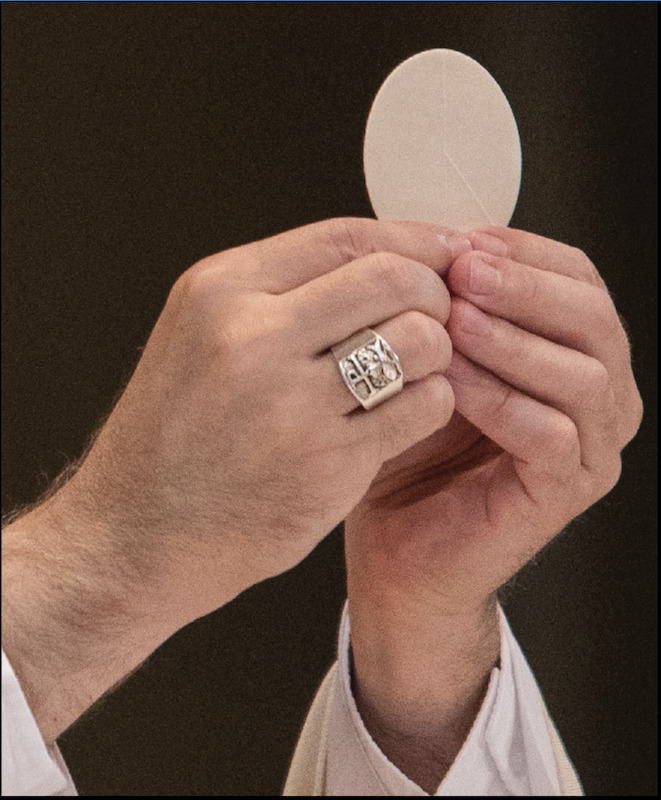In a recent phone conversation with one of my daughters, I learned that she consented to accompany a family member to a nondenominational worship service.
Having been asked numerous times, she finally agreed, but told them that her heart is in the Catholic Church where it will always be.
Later, Stephanie told me that the service was uplifting and the music professionally done, but as she looked around the space, she noticed that the cross was nowhere to be found.
In that case, I wondered if religion has become, for some, a place to escape the cross, a happy place to forget life’s problems – rather than the place where we can unite our crosses with the cross of Jesus.
The reason our Lord instituted the Eucharist on the night before he died, was so that he could take the Church to the cross with him the next day. Simply put: without the cross there would be no Eucharist, and without the Eucharist, there is no Church.
Several decades ago, I attended a conference in celebration of the 25th anniversary of the Second Vatican Council. I recall one of the speakers, who had a great devotion to Mary, saying that many wrongly assumed that Vatican II diminished the role of Mary, but that nothing could be further from the truth. She went on to say that if Mary’s role in the Church goes, the next thing to go will be the Eucharist.
I was shocked and thought to myself that could never happen. And yet here we are.
It’s been reported that fewer than 30% of all Catholics believe in the real presence of Jesus in the Eucharist and that the bread and wine are merely symbols. It’s no wonder then that the number of people leaving the Catholic Church for nondenominational churches is at an all-time high.
In referencing the Eucharist during one of his sermons, St. Augustine told his congregation, “Receive what you are and become what you can see.”
It’s a radical statement but as members of the body of Christ, we believe that when we receive Eucharist, we receive Jesus’ own body and blood, and that in doing so, we become a living sacrament and sign of Christ in our midst.
To be a sign of Christ is about acknowledging our deepest hunger and our need to be fed, but it also calls us to recognize the hunger, both spiritual and physical, of all people. As members of Christ’s own body, we are called to respond to the famine of those starving for love, and of the many who thirst for justice.
It means we can no longer turn away from the empty stares of those who live without love or hope, struggling to survive in a world of endless war, violence, and persecution.
Nor can we remain complacent in the face of growing disparity between the rich and the poor, for as St. Paul wrote, “If one member suffers, all suffer together with it; if one member is honored, all rejoice together with it. Now you are the body of Christ and individually members of it” (1 Cor 12:26-27).
The Eucharist binds us together as nothing else and no one else can. We cannot take lightly the sacrament of Eucharist, lest we become like Judas who, after receiving the bread dipped in the blood of Christ, left the Upper Room, after which, Scripture says, “it was night” (Jn 13:30).
As sacrament and sign, we are called to be light for the abused, the betrayed, and the broken. When we bring our gifts to the altar, we must be prepared to allow Jesus to take us into his hands, lift us to the Father, and break us, so that we can be passed around in imitation of the Christ whom we receive.
How we live this is unique to each person. Within each parish community, as in the universal Church, we see distinctly different gifts that each person is given, not for themselves but to feed the body of Christ.
At the end of every eucharistic liturgy, the priest or deacon sends the congregation forth to take what we have received into the world so that when we touch or are touched by one another, we will know that we are touching the body of Christ.
It’s impossible to do this on our own, but when we unite our life with that of Jesus, who gave his life for us, we – like Mary who stood at the foot of the cross – will know that all things are possible with God.
Barbara Hughes is an award-wining author, retreat facilitator and spiritual guide. She lives in Virginia Beach and can be reached at [email protected].

